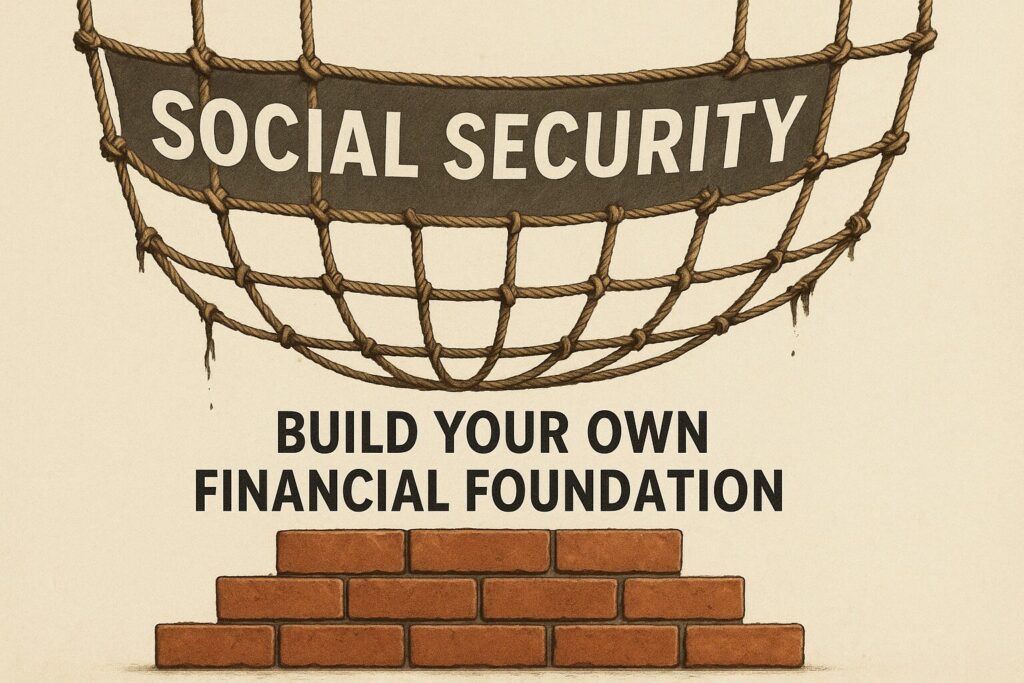
Why Social Security Isn’t Enough—And What You Can Do to Protect Yourself
Welcome to “Money Myths Retirees Still Believe”—a blog series that uncovers the hidden beliefs that can quietly sabotage your financial peace of mind.
Many retirees cling to common money myths that seem true but can lead to poor decisions, lost income, or unnecessary worry. Each post in this series explores one myth—like “cash is trash” or “I need to beat the market”—and replaces it with a smarter, simpler mindset.
If you’re retired or nearing retirement, this series will help you reassess your approach and feel more confident about your financial future.
The Myth: “The Government Will Take Care of Me”
Gloria, a 72-year-old widow, never worried much about money. “I’ve got my Social Security,” she’d say. “That’s what it’s there for, right?”
But when her property taxes went up, her Medicare premiums rose, and groceries kept getting more expensive, Gloria realized something: Social Security alone wasn’t cutting it anymore.
She began dipping into savings, feeling nervous for the first time in years. “I always assumed the government would make sure I was okay,” she admitted.
👉 She believed the myth that the government will fully protect retirees from financial hardship.
The reality? Social Security is a safety net—not a full retirement plan. And in the face of growing national debt and rising costs, it’s a net that could stretch thinner in the years ahead.
Why This Belief Persists
Social Security has been around since 1935. For generations, it’s been a dependable monthly check—one that millions of retirees rely on.
But here’s what’s changed:
- The cost of living has outpaced benefit increases.
- Healthcare expenses have skyrocketed.
- Pensions are disappearing, and many retirees lack significant personal savings.
- Federal deficits are exploding, putting pressure on entitlement programs like Social Security and Medicare.
It’s not that the government won’t help—it’s that it can’t guarantee your financial security forever.
The Big Red Flag: Sky-High Budget Deficits
The U.S. national debt is over $34 trillion and rising fast.
Social Security’s trust fund is projected to be insolvent by 2034, unless Congress acts. That doesn’t mean benefits will disappear—but they could be reduced by up to 20% if nothing is done.
Meanwhile, Medicare faces its own financial cliffs. And with an aging population and fewer workers supporting more retirees, the math gets harder every year.
In short: The government safety net is showing signs of strain.
If you’re depending on Social Security as your only or main source of retirement income, you may be vulnerable.
The Smarter Mindset: Build Your Own Safety Net
You don’t have to panic. You just need a plan that includes more than just Social Security.
Here’s how smart retirees take control of their future:
✅ Create Additional Income Streams
Supplement Social Security with:
- Dividend-paying ETFs or stocks
- Annuities that provide guaranteed monthly income
- Rental income (if manageable)
- A part-time passion project or side gig
✅ Use the Bucket Strategy
Separate your savings into short-term (cash), mid-term (income-producing investments), and long-term (growth). This gives you more stability and flexibility—especially if government benefits are reduced.
✅ Delay Social Security (If Possible)
Each year you delay taking benefits past your full retirement age boosts your monthly check by 8%—a powerful hedge against future cuts.
✅ Reduce Dependence on Entitlements
Use healthcare savings tools like HSAs, shop smart with Medicare Advantage vs. Medigap, and plan for out-of-pocket costs. Consider long-term care insurance if you can afford it.
✅ Stay Informed and Involved
Track what’s happening with Social Security and Medicare. Advocate for reform. Encourage your representatives to address long-term sustainability, not just short-term fixes.
A Real-Life Example
Leonard, a 70-year-old retired engineer, designed his retirement income so that Social Security makes up only 40% of his monthly income.
The rest comes from:
- A modest pension
- A diversified income fund
- A small annuity
- A part-time consulting gig he enjoys
If Social Security ever gets cut? He won’t be thrilled—but he won’t be devastated either.
“I respect what the government provides,” he says, “but I don’t rely on it completely. That’s my job.”
The Takeaway
Social Security is a valuable benefit—but it was never meant to be your full retirement paycheck.
And with the federal budget stretched and benefit reforms likely, depending solely on government programs could leave you short.
Better to view Social Security as a foundation—and build a stronger house on top of it.
✔ Create other sources of income
✔ Reduce financial stress with a clear, sustainable plan
✔ Stay flexible so you’re ready for whatever the future holds
Retirement security isn’t a promise—it’s a project.
And the best time to take control of it is right now.